A Comprehensive Overview of the Turkish Citizenship by Investment Program
1.1. Introduction to the Citizenship Program and Its Legal Framework
The Turkey Citizenship by Investment (TCBI) program is a legal initiative launched in January 2017 with the aim of attracting foreign direct investment. The program is governed by various laws, including the Turkish Citizenship Law No. 5901, as well as decisions made by the President. The primary goal of this program is to attract foreign investors and offer an easy and fast track to full citizenship and access to strategic European and Asian markets. The TCBI program allows investors to obtain Turkish nationality without the need for long-term residency in Turkey or proficiency in the Turkish language. This feature distinguishes the program from other traditional and time-consuming methods of obtaining Turkish citizenship, such as continuous 5-year residency, making it an attractive option for investors seeking flexibility and speed in the immigration process.
1.2. Evolution of the Minimum Investment Amount: From $250,000 to $400,000
A review of information sources regarding the minimum investment amount for obtaining Turkish citizenship through property purchase reveals conflicting data that can be confusing for investors. Some sources mention $250,000, while many others emphasize $400,000. This discrepancy is the result of a significant update in the regulations. Research indicates that the required investment amount was increased from $250,000 to $400,000 on May 13, 2022. This decision was made during a Presidential Cabinet meeting led by Erdoğan and represents a key change in investment attraction policies.
This price increase can be seen as a response to the unprecedented demand for Citizenship by Investment programs. With this action, the Turkish government aims to maintain the value and credibility of its passport, prevent potential abuse and an excessive increase in the foreign population, and attract more stable investments. Therefore, investors should be advised that figures below $400,000 are no longer legally valid, and to qualify, they must invest a minimum of $400,000 USD or its equivalent in Turkish Lira in real estate.
1.3. Main Eligibility Requirements and Legal Necessities
In addition to the investment amount, the Turkish property-based citizenship program has specific legal requirements that applicants must adhere to. The main applicant must be at least 18 years old, have a clean criminal record both nationally and internationally, and not be residing illegally in Turkey.
Key Investment Requirements:
- Prohibition of Sale: The property purchased for citizenship must not be sold for a period of three years from the date of purchase. This condition is officially registered on the title deed (Tapu).
- Source of Purchase: According to regulations, the applicant must purchase the property from a Turkish citizen or a Turkish construction company. This law is intended to help regulate the domestic real estate market and prevent speculation among foreign investors.
- Payment Method: All payments must be made via bank transfer from the applicant’s account to the seller’s account in a Turkish bank. Cash payment is no longer accepted, and the transaction receipt must be documented.
- Purchase of Multiple Properties: If an individual intends to purchase multiple properties to reach the minimum amount of $400,000, all title deeds must be registered under the applicant’s name simultaneously and on the same day. One source also suggests that these properties must be in a single geographical area. This difference in detail increases the importance of consulting with a reputable local lawyer before taking any action.
These precise requirements reflect the Turkish government’s effort for greater transparency and assurance of attracting genuine and sustainable investments that contribute to the country's long-term economic growth rather than speculation.
1.4. Table 1: Summary of Key Turkish Citizenship Program Criteria
This table provides investors with a quick and comprehensive view of the program's main requirements.
| Item | Required Criterion |
|---|---|
| Minimum Investment Amount | $400,000 USD |
| Holding Period for Property | Minimum 3 Years |
| Source of Purchase | From a Turkish Citizen or Company |
| Payment Method | Bank Transfer from Applicant's Account |
| Eligibility for Family Members | Spouse and Children under 18 |
Details of the Investment Process and Required Documents
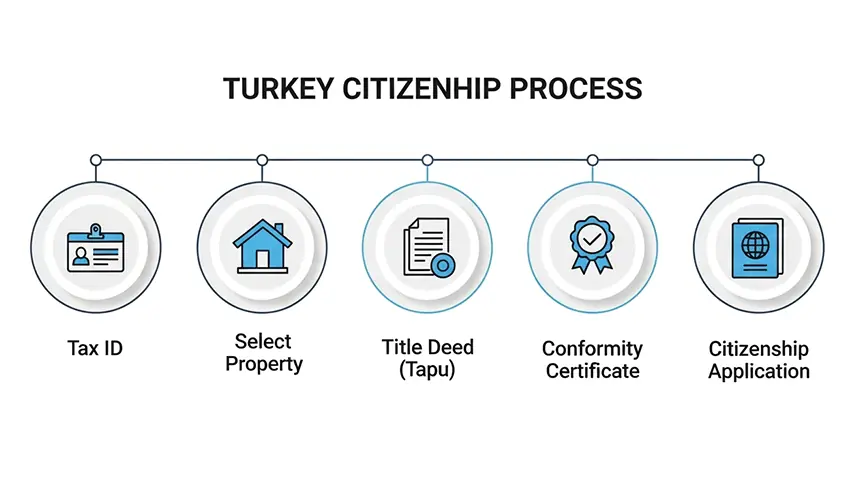
2.1. Step-by-Step Property Purchase Procedure for Citizenship
The process of obtaining Turkish citizenship through property purchase involves several specific and legal steps that require careful execution.
Step One: Obtaining a Tax Number and Opening a Bank Account
The first step is to obtain a Tax Number (Vergi Numarası) from the Turkish Tax Office. This number is essential for any financial transaction, including opening a bank account and transferring ownership. The applicant must then open a bank account at a Turkish bank using their original passport and Tax Number. This account will be used for the transfer of funds for the property purchase.
Step Two: Property Selection and Valuation
The investor can purchase a residential, commercial property, or even land (if it has a building permit). The properties must be ready for an official valuation report by a certified financial expert. This valuation report, confirmed by accredited institutions, determines the property's real value and is crucial for proving that the investment meets the minimum $400,000 threshold.
Step Three: Fund Transfer and Title Deed Acquisition
After finalizing the property selection, the applicant must transfer the full amount from their bank account to the seller's bank account via wire transfer. At this stage, the property title deed (Tapu) is transferred to the buyer's name, and it is officially stipulated that the property will not be sold for three years.
Step Four: Obtaining the Certificate of Conformity
After registering the title deed and completing the fund transfer, the applicant must apply to the Ministry of Environment, Urbanization, and Climate Change for a Certificate of Conformity. This certificate serves as official proof that the investment meets the citizenship program criteria.
Step Five: Applying for Turkish Residency and Citizenship
With the Certificate of Conformity, the applicant must first apply for a short-term residence permit. This residence permit is a necessary step before submitting the final citizenship application. Finally, after preparing all necessary documents, the final citizenship application is submitted to the General Directorate of Migration Management.
2.2. Required Documents and New Requirements (2025)
The citizenship application process requires submitting a complete set of documents. These include official translations of the passports and birth certificates of all applicants, a marriage certificate (if applicable), national and international police clearance certificates, biometric photos, and a valid health insurance policy in Turkey. However, the most significant changes in 2024 and 2025 relate to new strictures in the administrative process. These changes have been implemented to increase security and transparency in the processes:
- Mandatory Physical Presence: Unlike in the past where a large part of the process could be completed remotely, the main applicant and their spouse are now required to be physically present in Turkey to provide fingerprints and biometric photos. This requirement challenges advertisements promising a "fully remote" process and indicates that the Turkish government intends to verify applicants' identities with greater scrutiny.
- Police Clearance Certificate Requirement: Obtaining a police clearance certificate from the country of origin is now mandatory for the main applicant and their spouse. This measure aligns the applicant background check process with stricter international standards, such as those of the FATF (Financial Action Task Force).
- Residency Permit Requirement: In the past, only the main applicant needed a residence permit to apply for citizenship, but new regulations now require the spouse to obtain this permit as well. These changes have made the process more precise and transparent, encouraging applicants to provide more complete and accurate documentation.
Analysis of Timeline and Process Costs
3.1. Realistic Timeline: From Advertising Promises to Reality
One of the most attractive points in advertisements for Turkish citizenship programs is the short processing time. Some sources promise that the Turkish passport will be issued in "90 working days" or even "3 months." In contrast, more realistic data suggests that the process typically takes between "3 to 6 months" or even "4 to 12 months."
This contradiction arises because promises of short timelines often refer only to the initial stages of the process, such as property purchase in Turkey and obtaining the Certificate of Conformity, which can be completed in a few weeks or one to two months. However, the final review of the application by the Ministry of Interior and the General Directorate of Migration Management may take between 4 to 8 months or even longer. This review involves security checks and background investigation of the applicant, which is the most time-consuming part of the process. Consequently, expecting a timeline of 4 to 12 months is much more realistic than short-term promises.
3.2. Structure of Ancillary Costs
The $400,000 is only the main investment cost, and applicants must consider other ancillary expenses that can significantly add to their budget. These costs vary depending on the type and location of the property.
- Title Deed Transfer Fee (Tapu): This fee is equivalent to 4% of the property value, which is usually split equally between the buyer and the seller according to common practice.
- Value Added Tax (VAT): This tax can range from 1% to 18% of the property value, but some new construction projects are exempt from this tax.
- Legal Fee (Attorney's Fee): The lawyer's fee for handling legal and administrative matters can range from 1% to 2% of the property value.
- Government and Administrative Fees: These fees include the amount for the citizenship application (approximately $400) and the passport issuance fee (approximately $500).
- Translation and Notarization (Noter) Costs: Official documents such as passports and birth certificates must be officially translated and verified at a notary public (Noter), and these costs can reach $1,000 to $2,000.
Considering all these factors, it is estimated that ancillary costs can constitute between 5% and 8% of the main investment amount. Precise financial planning and awareness of these costs are essential to avoid financial surprises.
3.3. Table 2: Approximate Process Cost Structure
This table clearly shows the potential ancillary costs for a $400,000 investment in Turkey.
| Item | Approximate Cost | Description |
|---|---|---|
| Investment Amount | $400,000 | Minimum capital required for property purchase |
| Title Deed Transfer Fee | $16,000 (4%) | Usually split between the buyer and seller |
| Value Added Tax (VAT) | $4,000 to $72,000 (1%-18%) | Variable, some projects are exempt |
| Legal Fee | $4,000 to $8,000 (1%-2%) | Depends on the lawyer's services |
| Translation and Notary Costs | $1,000 to $2,000 | For document translation and verification |
| Government Fees | About $1,000 | Includes citizenship application and passport fees |
Chapter Four: Benefits and Investment Risk Analysis
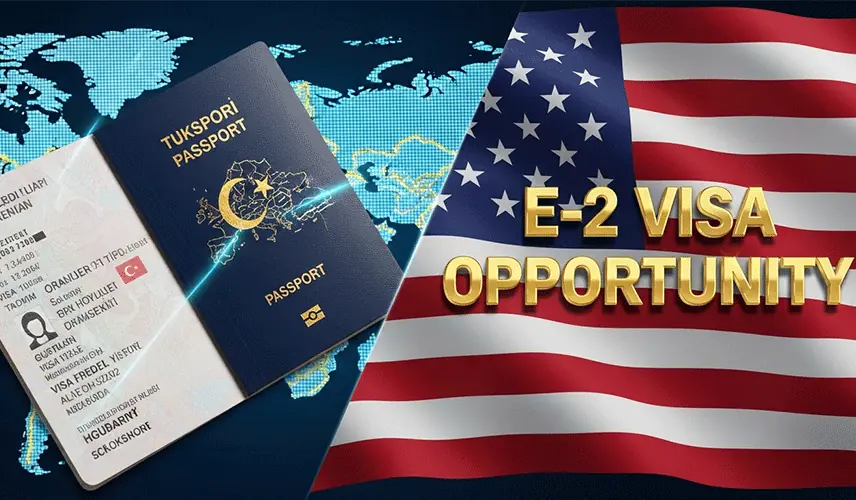
4.1. Key Benefits of the Turkish Passport and Citizenship
The Turkish passport offers numerous advantages to its holders, making it an attractive option for investors.
- Full Citizenship Rights: Upon receiving citizenship, the individual and their family members (spouse and children under 18) enjoy all the rights of a Turkish citizen. These rights include the right to vote, the ability to work in the public and private sectors without a work permit, free education, and access to quality healthcare services for life.
- Visa-Free Travel: The Turkish passport allows for visa-free or visa-on-arrival travel to over 100 countries worldwide. The exact number of these countries is reported differently in various sources (from 72 to 116 countries), indicating that for specific destinations, the most up-to-date information must be confirmed.
- Access to the US E-2 Investor Visa: One of the most unique benefits of the Turkish passport is the possibility to apply for the US E-2 visa. This visa allows Turkish citizens to live, work, and conduct business in the United States by investing in a US enterprise.
It is important to note that the E-2 visa is a non-immigrant, temporary visa and does not directly lead to permanent residency (Green Card). Furthermore, the applicant must make a secondary and substantial investment (usually a minimum of $150,000) in a US business. The fact that the E-2 process is a separate and costly procedure must be clearly communicated to the investor.
4.2. Analysis of Economic and Financial Risks
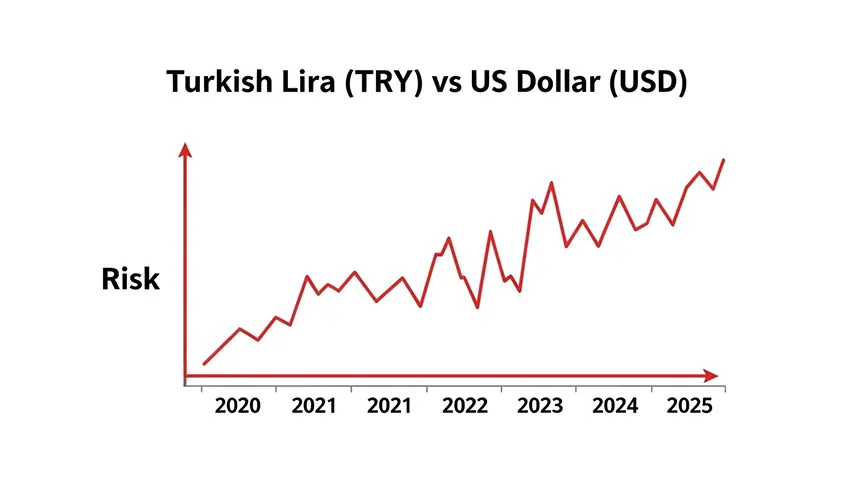
Alongside the notable benefits, investing in Turkey also comes with financial and economic risks that must be carefully considered.
- Lira Volatility and Inflation Risk: Multiple sources point to severe fluctuations in the value of the Turkish Lira against foreign currencies like the dollar. For instance, in 2018, the dollar rate was around 5 to 5.5 Lira, while in 2025, it has reached around 40 Lira. This sharp decline can affect the return on investment in Lira and is a major risk for investors who receive their income in Lira.
- Return Potential: Despite the currency risks, the Turkish real estate market remains attractive due to increasing demand and rising prices. Statistics show that housing prices have experienced significant growth in recent years, increasing by an average of 30% in the first eight months of 2024. Rent prices have also increased rapidly. Investors can mitigate risk and benefit from good returns by carefully selecting the type of property (small residential or commercial with guaranteed rent) and its location.
4.3. Table 3: Comparison of Potential and Risks of Investment in the Turkish Real Estate Market
This table neutrally presents the benefits and risks side-by-side to help investors make a more informed decision.
| Potential (Benefits) | Risks (Drawbacks) |
|---|---|
| High Property Price Growth | Severe Lira Value Fluctuations |
| Significant Rental Income | Risk of Inflation and Reduced Lira Purchasing Power |
| Dynamic Real Estate Market | Variable Tax Laws (Property Tax) |
| Possibility of Obtaining a Passport | Potential for Legal and Bureaucratic Complexities |
Strategic Comparison with Similar Programs (Greece, Portugal, Spain)
5.1. Comparison of Key Criteria
Comparing different immigration programs is highly important for choosing one. The citizenship program in Turkey and the residency-by-investment programs in European countries such as Greece and Spain have key differences.
- Amount and Outcome Type: While Greece and Spain grant residency with investments of €250,000 and €500,000 respectively, the Turkish program leads directly to citizenship and a passport with an investment of $400,000. This is a fundamental difference: Turkey offers direct citizenship, whereas European programs initially grant temporary residency, which may lead to citizenship after years of residency and meeting certain conditions.
- Physical Presence Requirements: One of the significant advantages of the Turkish program is the lack of a physical presence requirement to maintain citizenship after it is granted. This is a major benefit for investors who do not intend to live in Turkey. In contrast, some European programs, such as Spain's non-lucrative visa, require long-term physical residency.
5.2. Analysis of the Turkish Program's Strengths and Weaknesses
Strengths:
- Fast Track: The Turkish program is one of the fastest routes to obtaining a passport through investment globally.
- Flexibility: The program has no condition for residency or living in Turkey.
- Access to the E-2 Visa: This competitive advantage provides opportunities for business and life in the US.
- Dual Citizenship: Turkey allows dual citizenship, so the applicant is not forced to renounce their previous nationality.
Weaknesses:
- Currency Risk: Severe Lira fluctuations can undermine the value of the initial investment.
- Non-Schengen Membership: Turkish passport holders require a visa to travel to countries in the Schengen area, while a Greek or Spanish passport provides visa-free access to this zone.
5.3. Table 4: Comprehensive Comparison of the Turkish Citizenship Program with European Programs
This table provides a strategic comparison of the programs, helping the investor choose the best option based on their goals.
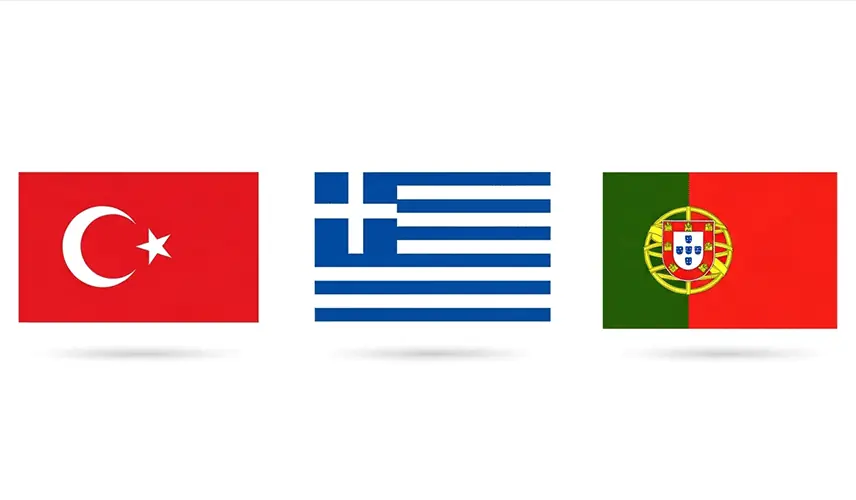
| Feature | Turkey | Greece | Portugal |
|---|---|---|---|
| Program Type | Direct Citizenship | Residency (Leads to Citizenship) | Residency (Leads to Citizenship) |
| Minimum Investment | $400,000 | €250,000 | Starts from €250,000 depending on investment type |
| Time to Passport | 4 to 12 Months | 7 Years or More | 5 Years or More |
| Physical Residency Requirement | None | None (to maintain residency) | 7 Days per Year (to maintain residency) |
| Schengen Access | Visa Required | Yes (After obtaining residency) | Yes (After obtaining residency) |
| US E-2 Access | Yes | No | No |
Conclusion and Expert Recommendations:
The Turkish Citizenship by Investment through property purchase program is a fast and relatively direct path to full citizenship, achievable with a minimum investment of $400,000. This program offers significant advantages such as access to full civil rights, visa-free travel to over 100 countries, and most importantly, eligibility for the US E-2 visa. However, the investor must approach this opportunity with a realistic perspective and be aware of economic risks, especially the severe fluctuations of the Turkish Lira and inflation.

Expert Recommendations:
-
Thorough Research and Legal Consultation: Due to frequent legal changes and conflicting information in various sources, it is essential that applicants consult with a reputable immigration lawyer and real estate expert before taking any action.
-
Risk Management: The investor must take the currency risk seriously and, if possible, manage it by using strategies such as renting out the property with a currency-based contract or investing in commercial properties with a fixed return.
- Focus on Long-Term Goals: If the main goal is free access to the Schengen area, alternative European programs might be more suitable. However, if speed, flexibility, and access to business opportunities in the US are priorities, Turkey is a strong and strategic choice.
- Preparedness for Physical Presence: Given the new regulations, the applicant must be prepared to travel to Turkey to provide fingerprints and meet other biometric requirements.
- Utilize Specialized Consultants: For Iranian investors, collaborating with Persian-speaking consultants and lawyers who are fully familiar with the laws and culture of both countries can facilitate the process and prevent potential problems. These consultants can provide valuable guidance on price transparency and legal issues.

 USD
USD
 TRY
TRY
 EUR
EUR
 IRR
IRR
 RUB
RUB

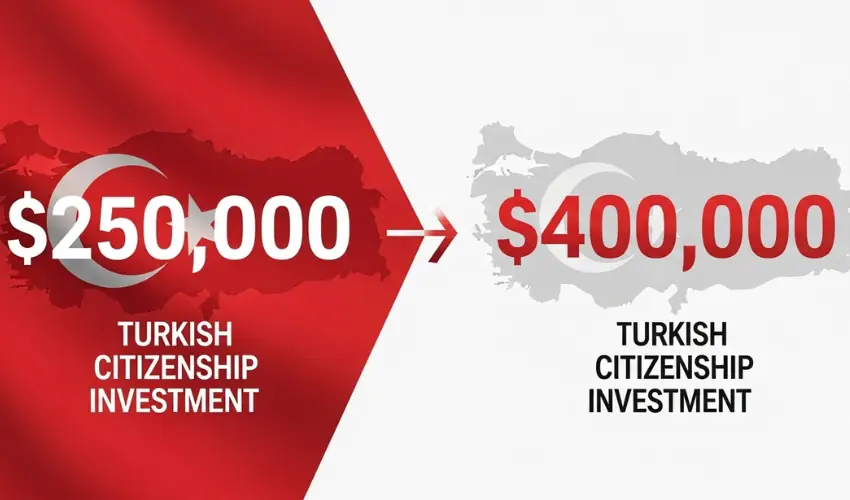
Comments